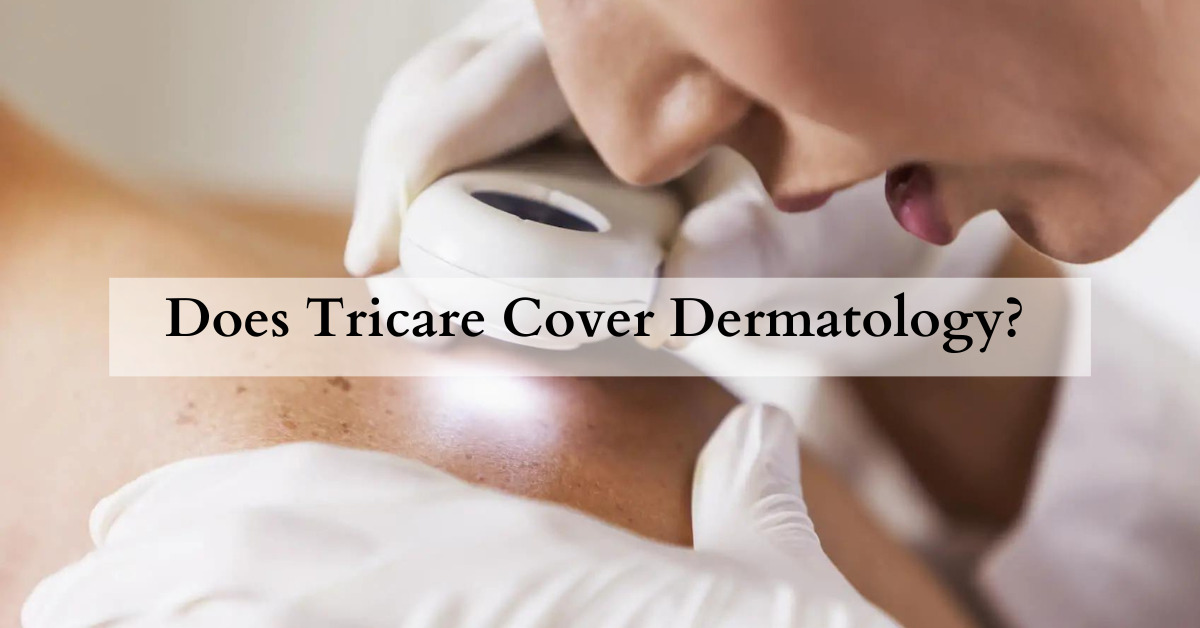Tricare is a comprehensive healthcare program that serves active-duty service members, National Guard and Reserve members, retirees, and their families. It offers various health plans to ensure beneficiaries receive the necessary medical care. One area of concern is Tricare Select Dermatology. Skin issues are prevalent and can range from mild irritations to chronic conditions that require specialized care. In this article, we will explore whether Tricare covers dermatology and what you need to know about seeking dermatological services under this program.
Understanding Tricare Health Insurance:
Before delving into the specifics of dermatology coverage, it’s essential to understand the basics of Tricare health insurance. Tricare offers several plans, including Tricare Prime and Tricare Select. While the coverage details may vary, Tricare’s mission is to provide access to high-quality healthcare services to its beneficiaries.
What are the different types of Tricare plans?
Does Tricare cover dermatology? Tricare is a healthcare program for military personnel, retirees, and their families. It provides a range of health services and benefits, such as hospital care, OPD, prescriptions, and preventive services. Tricare is handled by the DoD (Department of Defense) and is accessible to those entitled to it based on their military position.
In that respect, different Tricare plans are contingent on your position, placement, and needs. A few standard picks include:
- Tricare Prime: Does Tricare Prime cover dermatology? Yes, a carried-off care choice similar to a Health Maintenance Organization (HMO) that needs primary care managers (PCMs) and referrals to medical specialists.
- Tricare Select: A fee-for-service pick that provides a lot of flexibility in selecting health professionals without requiring referrals.
- Tricare For Life: Allows additional coverage for those entitled to Medicare.
- Tricare Reserve Select: For members of the National Guard and Reserve.
Every plan has particular features, eligibility requisites, and cost structures, so it is all-important to review them based on your specific circumstances.
Coverage for Medical Specialties:
a. Does Tricare Cover Dermatology?
Yes, Tricare does cover dermatology services. Whether you’re an active-duty service member, retiree, or a family member, Tricare selects dermatology so you can access dermatological care through Tricare. This coverage extends to various skin conditions, from acne and rashes to more complex issues like skin cancer.
b. Types of Dermatological Services Covered:
Tricare covers a broad spectrum of dermatological services, including preventive care, diagnosis, and treatment. Here are some common services covered:
- Skin cancer screenings
- Treatment for acne and acne-related scars
- Management of skin allergies and rashes
- Management of chronic skin conditions such as psoriasis or eczema
- Wound care and treatment for skin infections
- Surgical procedures for skin conditions (if medically necessary)
Eligibility and Plans:
To access Tricare’s dermatology coverage, you need to be eligible for the program. The eligibility criteria can vary based on your status (active duty, retiree, family member) and the specific Tricare plan you’re enrolled in. It’s essential to confirm your eligibility and plan details to understand your coverage fully.
Making Appointments:
Scheduling an appointment with a dermatologist under Tricare is relatively straightforward. You’ll need to contact a Tricare-authorized provider. If your primary care manager (PCM) believes you need dermatological care, they can refer you to a dermatologist. However, in some cases, you may not need a referral to see a dermatologist.
Copayments and Deductibles:
Understand that you may have out-of-pocket costs when seeking dermatology services through Tricare. These costs typically include copayments and deductibles. The specific amounts depend on your Tricare plan and your military status. It’s advisable to check the Tricare website or contact their customer service for the most accurate cost information.
What are the situations when you need to use Tricare?
Does Tricare cover dermatology? In which situation Tricare can utilize? You had better utilize Tricare when you require medical aid and are eligible for its benefits. Here are a few basic situations when you may utilize Tricare:
- Routine Check-Ups and Vaccinations: Schedule routine doctor visits, coverings, and vaccinations to keep up your health.
- Medical Emergencies: In case of an emergency, seek prompt care. Tricare offers emergency services both in and out of the network.
- Medical Specialist Visits: Contingent on your Tricare plan, you may require a primary care manager (PCM) referral to check a medical specialist.
- Hospital Care: If you are admitted to a hospital, Tricare will assist in handling the costs, including inmate care and essential operations.
- Prescription Drugs: Tricare proposes prescription medicine insurance coverage, so utilize your benefits to fill up medicines at network drugstores or through the TRICARE Chemist Program.
- Mental Health Services: Tricare allows coverage for mental healthcare, including therapy and guidance.
- Preventive Services: Tricare provides preventive services such as cancer screenings, immunizations, and health visits.
- Pregnancy and Childbirth: Utilize Tricare for prenatal care, delivery, and postpartum care.
- Habitual Circumstances: If you have a habitual condition, such as diabetes or high blood pressure, TRICARE can assist in coping and handling these circumstances.
- Family Care: Your dependents are also covered under Tricare, and they can access medical services as required.
Always check your Tricare plan particulars, as insurance coverage and procedures can change. If you are unsure about using your benefits or require help, reaching your Tricare representative or visiting the Tricare site can provide counseling tailored to your situation.
How to Find a Tricare-Authorized Dermatologist?
To ensure you receive the benefits of your Tricare coverage, it’s crucial to choose a dermatologist who is part of the Tricare network. You can search for Tricare-authorized providers on the Tricare website. Be sure to verify their network status before scheduling an appointment.
Utilizing Tricare Online Tools:
Tricare offers various online tools and resources to help you manage your healthcare. You can use the Tricare Online Patient Portal to schedule appointments, view your medical history, and access important healthcare information. These tools make it easier to navigate your dermatology care.
Tips for a Successful Dermatology Visit with Tricare:
Here are some tips to make your dermatology visit under Tricare more efficient and productive:
- Bring your Tricare ID card to your appointment.
- Be prepared to discuss your medical history and the specific reason for your visit.
- Have a list of any medications you are currently taking.
- Be ready to ask questions and engage with your dermatologist about your skin concerns.
Conclusion:
In conclusion, Tricare does cover dermatology services, making it accessible to its beneficiaries. Whether you are dealing with a skin issue that requires medical attention or needs preventive care, Tricare provides options for dermatological services. However, it’s crucial to understand your eligibility, the specific plan you are enrolled in, and any associated costs.
FAQ Section
How can I check if Tricare covers my specific dermatological treatment?
You can verify the coverage of specific dermatological treatments by consulting the Tricare website or contacting their customer service for detailed information.
Can I get dermatology services without a referral?
In some cases, you may not need a referral to see a Tricare dermatology coverage. Check with your primary care manager for guidance.
What are the most common skin conditions treated by dermatologists under Tricare?
Dermatologists under Tricare commonly treat conditions such as acne, skin allergies, skin infections, and skin cancer.
Is there a difference in coverage between Tricare Prime and Tricare Select?
Yes, there can be variations in coverage between Tricare Prime and Tricare Select. It’s essential to understand the specific benefits of Tricare dermatology coverage.
Does Tricare Prime cover dermatology?
Yes, Tricare Prime covers dermatology services.





